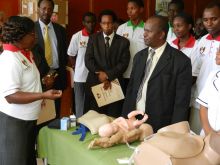
“So, why is a small college from rural Canada working in Africa?”
Having heard this question several times since the launch of the College of the Rockies (COTR) led MNCH project in Kenya, I’ve evolved in how I feel, assess, and respond to it. Initially my comments tended to be defensive, trying hard to prove that our institution – small, yes, but a strong, public post secondary college with a decade of experience in Kenya – had the ability to operate in a space crowded with large international NGOs and research universities. As the project coordinator, I tried desperately to rattle off statistics for how much experience we had, explain our solid network of partners, and demonstrate our understanding of current global health practices. However, I always felt that this defensive approach was inadequate, and didn’t answer the fundamental question: why?
Too often in development work – and many other fields – actors don’t ask the question of ‘why’ when they approach a funding opportunity or a development challenge. It is generally assumed that if you’ve worked in a certain environment before, you should continue to do so. In a country like Kenya, which is certainly a very active (and crowded) environment for global health projects, I’ve come to appreciate that asking why a certain organization is better positioned than others is a valid question. As COTR moves towards the end of the second year of our five year DFATD-funded project, a moment of reflection provides some insight into what it is we are doing, why we are doing it, and what unique approaches we bring to MNCH work.
I won’t get into too many of the background details, which can be found here at the website for our project: MAISHA (Maternal Access and Infant Survival for Health Advancement). However, in essence our project is improving rural MNCH care by strengthening community health systems. We are working with the county governments and Ministry of Health to train community health workers, improve their integration into the health system, and improve the quality of MNCH care at rural facilities to which CHWs will refer patients.
COTR’s strength as a training institution is in utilizing innovative and sustainable approaches to training. From the outset, we were not interested in merely coming in, training ‘X’ number of CHWs, and then patting ourselves on the back. By capitalizing on our 9-year relationship with Dedan Kimathi University of Technology (DeKUT), we have set in place a local and sustainable training system for personnel involved in MNCH at the community level. Some quick examples:
The majority of the nursing faculty at DeKUT are now qualified as instructors in an internationally recognized Emergency Obstetric Care (EmOC) training program developed with the Kenyan MOH. These instructors will be engaged both by the project and the national and county governments to ensure EmOC skills remain high during and after the life of the project.
COTR will capitalize on DeKUT’s role as a national training university through the development of a training program for CHW supervisors, which will see local MOH staff be given both initial training and access to refresher training with modern equipment and resources during and after the project.
COTR will pilot an integrated blended learning process for training CHWs remotely through mobile technology, leveraging skills in distance learning with capacity in locally appropriate technology development. This is a key need for scaling up CHW programs throughout the region and globally, as identified by the 1 Million CHW Campaign.
Everybody involved in this partnership feels strongly that effective MNCH change can only occur when: (a) interventions are integrated into health systems, (b) community-based primary care is supported by investments in health facilities, and (c) sustainability – not just financial – is built into a project from the beginning. COTR and DeKUT view MAISHA less as a service delivery project and more as part of a broader health systems strengthening approach.
Ultimately, these factors help me answer the question I posed earlier: COTR might indeed be a small college in Cranbrook, British Columbia, but it is actively helping to build high quality systems for health training and support in Kenya. The hope is that when project activities wrap-up in 2017, we will have made a small difference in Kenya’s ability to maintain a skilled health work force, and thereby help contribute to the overall mandate of the Government of Canada and Can-MNCH to improve the lives of women and children around the world.
Moritz Schmidt manages the MAISHA MNCH project for College of the Rockies. He can be reached at [email protected].